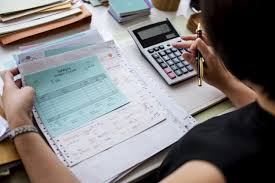What are the functions of bookkeeping?
Bookkeeping is the activities concerned with the systematic recording and classification of financial data of an organization in an orderly manner. It is essentially a record-keeping function done to assist in the process of accounting. It is a key component in forming the financial statements of the organization at the end of the financial year.
Bookkeeping also concerns itself with the classification of financial transactions and events. Such classification of transactions is essential to maintain proper financial accounts. It also involves preparing source documents for the financial transactions and other business operations being carried out.
There are many methods of book-keeping. The most common ones are the double-entry system and the single-entry system. But even methods other than these, which involves the process of recording financial transactions in any manner are acceptable book-keeping systems or processes.

The function of bookkeeping
Bookkeeping is the process of recording daily transactions in a consistent way, and is a key component to building a financially successful business.
Bookkeeping is comprised of:
- Recording financial transactions
- Posting debits and credits
- Producing invoices
- Maintaining and balancing subsidiaries, general ledgers, and historical accounts
- Completing payroll
Maintaining a general ledger is one of the main components of bookkeeping. The general ledger is a basic document where a bookkeeper records the amounts from sale and expense receipts. This is referred to as posting and the more sales that are completed, the more often the ledger is posted. A ledger can be created with specialized software, a computer spreadsheet, or simply a lined sheet of paper.
The complexity of a bookkeeping system often depends on the the size of the business and the number of transactions that are completed daily, weekly, and monthly. All sales and purchases made by your business need to be recorded in the ledger, and certain items need supporting documents. The IRS lays out which business transactions require supporting documents on their website.

Other Tasks
Bookkeepers often develop a skill set and specialized knowledge particular to the company for which they are employed. They may utilize specialized coding procedures to maintain records of debits and credits, create unique functions in computer programs to meet the accounting needs of the business and develop or adjust procedures for keeping track of finances. Bookkeepers have to stay informed inside the business to ensure that all money is accounted for. They must create or use systems for communicating with employees to track expenses or payments are crucial. In many businesses, bookkeepers are also responsible for making sure that taxes are paid to local, federal and state governments. They must submit tax documents to the appropriate offices, ensure that employees have proper documentation and identification on file, and calculate estimated taxes when necessary.

Produce Financial Reports
Ask any bookkeeper there most valuable trait, and they’ll tell you their ability to produce financial reports. The financial reports give a detailed account of how the business is performing; there are three main reports that every business needs.
Balance Sheet
The balance sheet is a collection of all the assets and liabilities of a business, it’s used to determine how much a business is worth. If a business owner ever wants to sell his business the first thing a potential buyers will ask for is the balance sheet. The balance sheet also tells us how much owner’s equity there is, If there are multiple partners it can be used to determine each person’s individual stake. Also remember that the accounting equation Liabilities + Owners Equity = Assets. Must be true for every balance sheet.
Cash Flow Statement
Cash is king. You’ve probably heard this quote a thousand times in your life and for good reason because if a business wants to stay in business they need cash. In Fact not being able to generate a positive cash flow every month is one of the biggest reasons why businesses fail. Now that you are aware of how important cash is to a business, you can see why there is such a high need to monitor cash flow.The cash flow statement makes it easy to do this and combines all the data to give you your net cash flow for the month. The cash flow statement also shows you where all the money is coming from, so you can focus more on high cash producing projects, while also showing you areas in your business where your losing money so you can better manage them.
The Profit and Loss
The profit and loss statement accumulates all of the expenses and income for a business. Like the name suggest this statement lets business owners know if there profitable or not. Producing an accurate profit and loss statement can only be done, if the other 3 functions of bookkeeping where done properly, because every mistake in not recording an expense, or mistakes made in accounts receivable/payable will show up in your profit and loss statement. The goal of every business is to make money and be profitable, so if you produce an inaccurate profit and loss statement it can give the owner the wrong information about his business, which can lead to making wrong decisions.
The bookkeeper’s role
Is to keep his accounts according not only to basic bookkeeping principles but also with regard to the company’s rules and specifications and most importantly following legal requirements. If in doubt the bookkeeper should refer to HMRC or his local tax consultant. A bookkeeper will need to bring to light any practices which could lead to errors in the business books and then work with the business managers to rectify the system and update any official bodies and so on. Mistakes need to be put right as soon as possible to avoid penalties which could further impact company finances.
The bookkeeper will need to have great data entry skills and thoroughness. She will need to have a head for figures and double check her work at all times. She will know what is happening in the monetary core of the company and be discrete and keep the information safe and away from third parties. Confidentiality will be maintained in everything she does. Her filing systems will be orderly and also updated as and when for instance when data needs be destroyed once it has served its purpose. She will also make sure that the relevant information is never deleted or corrupted.
The function of the bookkeeper could also involve recording the value of property and other financial fixed assets. He or she may also take on further responsibilities such as chasing up late payments, purchasing (buying) and generally constantly working to become increasingly efficient so helping to improve the profit of the business and contribute to the net income or the ‘bottom line’ (the actual money made after all the sales and expenses have been calculated).

Recent Comments